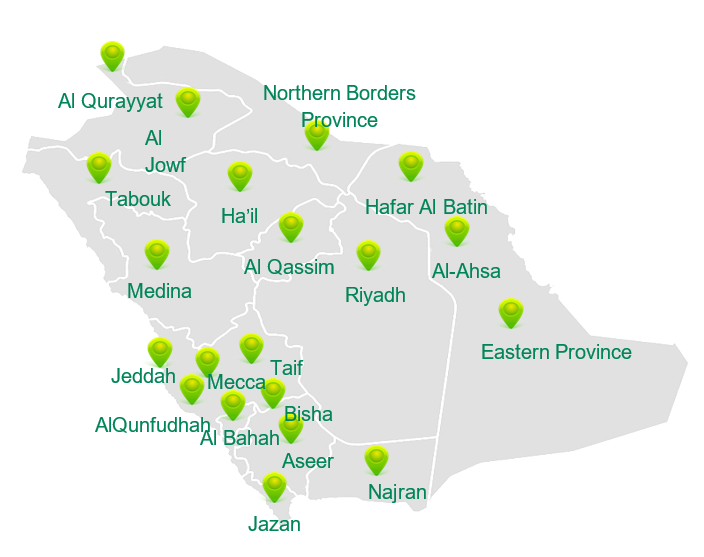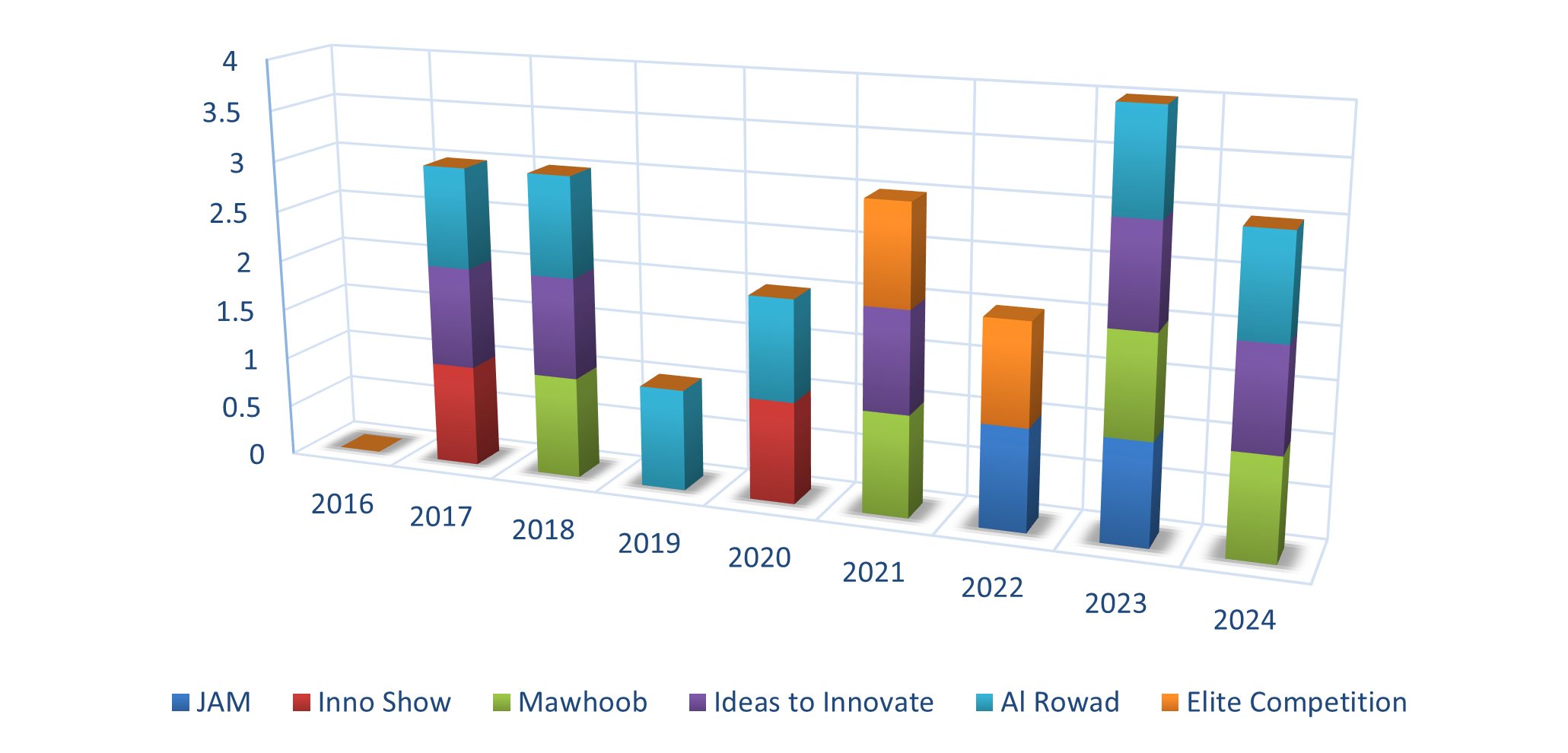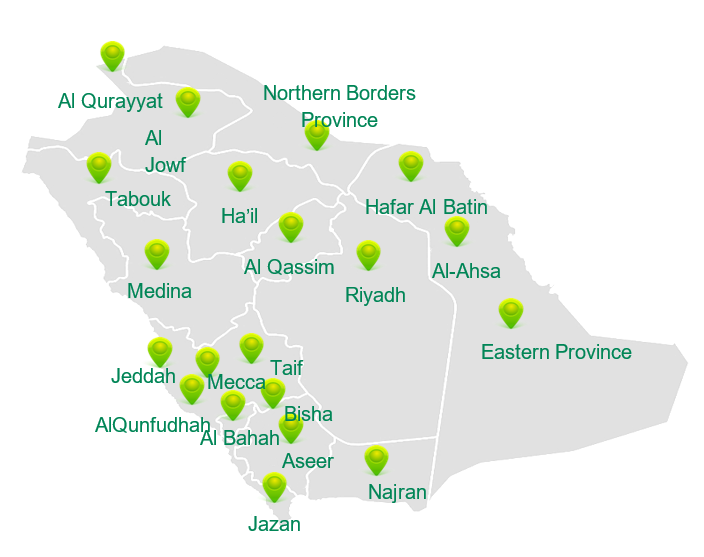Volume 5, Issue 7
July 2025
The Innovation Centre in the Saudi Ministry of Health: Past, Present, and Future
Mariam M. AlEissa, Hala A. Alosaimi, Ibrahim Alasiri, Saad Almushawah, Dalal Albaklani, Najlaa Omran Kateb
DOI: http://dx.doi.org/10.52533/JOHS.2025.50701
Keywords: Ministry of Health, Saudi Arabia, talent, innovation, health
Vision 2030 outlines a comprehensive modernization plan for Saudi Arabia, focusing on transforming the healthcare sector. The initiative aims to evolve from a centralized system to a high-quality, efficient healthcare framework. Over the past nine years, the Ministry of Health (MOH) has established the Innovation Center to nurture talent, enhance global connections, and integrate advanced technologies in healthcare. This centre develops innovative ideas into actionable projects that benefit patients and equips healthcare leaders with strategies for evidence-based decision-making. Since its inception in 2016, the Innovation Center has launched initiatives like the Mawhoob program to support talent development, ultimately striving to embed innovation within the healthcare ecosystem and address future challenges.
Introduction
The Ministry of Health (MOH) of Saudi Arabia founded the Innovation Canter in 2016 to foster a creative environment that nurtures innovative ideas from its staff, ultimately aimed at improving citizen health through enhanced healthcare services (1). This initiative aligns with Saudi Arabia's Vision 2030 and is propelling ambitious modernisation efforts in the healthcare sector. Vision 2030 focuses on enhancing public services, especially healthcare, and diversifying Saudi Arabia's economy, which is the driving force behind this initiative. The Innovation Centre, as a hub for innovative problem-solving, research and medical advancements in healthcare, is integral to this mission (2). It plays a vital role in fostering collaboration among healthcare professionals, researchers and global technology leaders.
Vision 2030, introduced in 2016 by Crown Prince Mohammed bin Salman, is a comprehensive reform plan aimed at transitioning Saudi Arabia from a primarily oil-dependent economy to a knowledge-based economy. Among its key focus areas is modernisation of the healthcare system through privatisation and increased investment in healthcare infrastructure and the adoption of cutting-edge and efficient technologies to provide high-quality, cost-effective universal healthcare services, thereby improving citizens' lives and enabling the country to become a global leader in healthcare innovation (3).
The MOH leads this initiative with various programmes designed to transform healthcare delivery (3). The Innovation Centre aligns with the objectives of Vision 2030 by spearheading technological advancements and collaborative research initiatives, facilitating idea development and accelerating projects that redesign services, resulting in highly effective health solutions in the form of numerous impactful projects. Through partnerships with various stakeholders, it promotes the creation of groundbreaking ideas and solutions in healthcare, significantly enhancing health services in the region. The centre’s dedication to continuous improvement and staff engagement has established it as a leader in health innovation (4). By engaging 270,000 employees in fostering an innovative culture and empowering 50 dedicated specialists to drive creative solutions, the program has transformed the organization’s approach to healthcare delivery. Furthermore, 2,000 innovative ideas have been incubated, leading to the implementation of 100 entrepreneurial ideas, significantly enhancing the centre’s capacity for innovation and responsiveness to emerging challenges.
The Innovation Centre has been recognized for its excellence in healthcare innovation and received official accreditation from the Global Innovation Institute (GInI) on February 21, 2022, valid until February 21, 2025. This achievement highlights the centre's commitment to creating an environment that fosters innovative ideas and solutions aimed at improving public health (5) and confirms the centre's use of effective strategies and its fulfillment of the standards and criteria established by the accrediting body. The initiative has established 24 innovation offices across various regions and governorates, alongside 6 specialized Innovation Offices focused on health clusters. This paper examines the history and future endeavours of the Innovation Center that contribute to health advancement and prosperity.
Review
Innovation Centre
The vision
The vision for the Innovation Centre was for the MOH and its affiliated facilities to have a creative environment that supports its associates' ideas and enables them to design new products and innovative health services. The centre oversees the innovation ecosystem in the MOH by creating satellite offices (Figure 1) in different regions to monitor and implement innovation policies and procedures; facilitate and monitor projects by creating operational plans and Key Performance Indicators (KPIs) tools; and offer educational and training workshops. The Innovation Centre was launched alongside several key initiatives aimed at transforming the healthcare landscape (Figure 2).

Figure 1: Ministry of Health Innovation satellite offices around Saudi Arabia

Figure 2: Health Innovation Centre timeline achievements
Health Creativity Initiative
Launched in March 2018, this programme was aimed at empowering the ideas of healthcare professionals so they could propose innovative solutions and implement them within their hospitals and clinics (6). This initiative was critical in identifying and nurturing talent, with 15 new talents being discovered through the Talented Initiative, or, as it is called in Arabic, Mawhoob (7).
Virtual Reality (VR) for Training
Starting in August 2018, the Innovation Centre explored the use of VR in healthcare training programs, incorporating immersive technology to improve the hands-on learning experience of medical professionals, thereby ensuring improved service delivery (7). This initiative aims to remove fear in children during vaccination or when drawing a blood sample, demonstrating that the experience of vaccination is a painful and unpleasant experience for children. The VR experience will be different for the child, and the procedures for the vaccination process will be facilitated with complete ease, without any assessment of healthcare workers or family members to stabilise the child, by creating an experience that keeps the vaccination process part of his imagination (8).
Mawhoob Programme
The Innovation Centre's Mawhoob programme was designed to identify and cultivate exceptional healthcare talent within the Saudi workforce. By empowering healthcare workers to propose and develop innovative solutions, the programme fosters creativity and experimentation (9) and promotes a culture of continuous improvement and problem-solving across the sector. The programme's success is evident in the number of innovations introduced in hospitals and clinics throughout Saudi Arabia, many of which have led to improved patient outcomes and increased efficiency in healthcare delivery. The Mawhoob programme aligns with the broader goals of Vision 2030, particularly by promoting human capital development and an innovation-driven economy (5).
Create with an Idea
His Excellency Dr. Tawfiq bin Fawzan Al-Rabiah, the former Minister of Health, launched an annual competition award, "Create with an Idea", with the Innovation Centre team (9) to facilitate creative ideas from MOH employees. The committee supervising the competition applies several criteria based on innovation and creativity. Participants submit individual or collective ideas according to specific criteria and KPIs (9). The ideas are sorted, identified, and nominated for the highest competitive stages by judging committees until ten winning ideas are selected, which are transformed into projects after the results are announced (9–11).
Pioneers Award
Dr. Al-Rabiah also initiated the annual Health Innovation (Pioneers) Award for the best-implemented initiatives that contribute to achieving tangible results that reflect positively on the improvement and development of health services and improve patients' experience and healthcare providers in the MOH. The award is organised by the MOH and represented by the Innovation Centre, and over 400 initiatives have been received by the judging committees (11).
Implementation of Cutting-Edge Technology
In collaboration with top companies and institutions such as Abdul Latif Jameel Health, the MOH introduced the innovative AVNeo heart surgery technique—that is, aortic valve restoration surgery using the patient's own pericardium (12), making Saudi Arabia the first Gulf country to adopt the technique. The technique, developed by Professor Shigeyuki Ozaki, provides an alternative to conventional valve replacement, and it leads to a high 10-year survival rate of 85.9% and lessens the need for long-term medication. The partnership seeks to certify and further train regional surgeons so that they can employ the technique (13).
Creativity Theatre
Started in 2018, the Creativity Theatre initiative features several inspirational innovators from the staff of Riyadh Health, who have participated in the Creativity Theatre events. These events are regular forums to encourage a creative culture and support creators by showcasing their successful experiences and achievements. The forums aim to draw innovators and inspirations from various industries and foster a creative culture that advances professional growth (14).
Innovation Recognition and Implementation of "Tayammumi"
The "Tayammumi" project is a remarkable example of innovation in healthcare aimed at enhancing the spiritual and physical well-being of patients. The initiative began with a simple yet profound idea to create a convenient and hygienic solution for patients to easily perform tayammum (a form of dry ablution) when water is unavailable. The final product is a box of 25 individually sealed and purified pure earth soft soil-soaked tissues that can be used instead of wudu, without risking infection or compromising religious purity by reusing the same soil. It also reduces material costs (6). The initiative received significant backing from the MOH, leading to the distribution of 168,000 boxes across Saudi Arabia, including 25,248 specifically allocated for the Hajj season, thus highlighting the project's impact on public health and spiritual practices. The project received the Pioneers Award from the Minister of Health, Fahad Al-Jalajel, for promoting health and wellness in the community. It exemplifies the power of innovative thinking and collaboration in transforming ideas into successful healthcare solutions (6). The wipes can be manufactured inside Saudi Arabia and have the approval of the Council of Senior Shaikhs, as well as the approval of the MOH. This project obtained an innovation patent from the Saudi Authority for Intellectual Property, as it achieves a legitimate goal as well as a health goal, in addition to promoting local content and reducing financial costs (7).
Hackathons
The Innovation Centre has participated in numerous hackathons, showcasing the dynamic intersection of technology and medicine. Senior Saudi authorities have recognised these efforts by presenting awards that underscore this vital partnership (15). The centre has also led by hosting and organising these events, with the most recent being the launch of the Hajj Health Innovation Journey initiative, "Saha Thon." (16).This initiative aims to foster a culture of innovation and create a competitive environment for developing groundbreaking ideas and solutions that enhance the health experience of pilgrims. Furthermore, Saha Thon seeks to engage both the private and public sectors in co-designing innovative and sustainable health products. This collaborative approach aligns with Saudi Arabia's Vision 2030, emphasising the importance of improving the overall pilgrim experience through strategic innovation (16,17).
Cooperation Points
The centre facilitates collaboration with Saudi Arabia's top universities, including both King Saud University (18) by signing an agreement for training with the College of Science and Princess Nourah bint Abdulrahman University (19). The centre supported and collaborated with different health institutions at different levels in 2020. The Innovation Centre also signed a memorandum of understanding to support and encourage creativity and innovation in healthcare with the Makkah Medical Centre (20), Saud Medical Innovation Centre and King Fahad Medical City (21). To facilitate ideas and introduce them in the market, the Innovation Centre collaborated with Monshaat to sign an accelerator agreement in the health field (14), to support funding and implement an agreement to facilitate healthcare projects between the Innovation centre and SABIC (22). The centre's main criteria for collaboration are as follows:
-
Collaborating to promote a culture of creativity and innovation and facilitate the acceleration of projects in the healthcare sector in Saudi Arabia.
-
Exchanging information and expertise aimed at increasing and enhancing local innovative content.
-
Working on the development of innovative products and applications in the healthcare sector.
-
Contributing to the establishment of preliminary models for incubator programs in the healthcare sector.
-
Exchanging scientific and technical consultations that serve the interests of both parties.
-
Forming a working team to manage the activities between the parties.
-
Through these efforts, the Innovation Center has become a cornerstone of the MOH vision for transforming Saudi Arabia's healthcare sector into one that is dynamic, efficient and able to tackle future challenges.
Conclusion
The Innovation Center in Saudi Arabia has made significant progress in enhancing innovation in the healthcare sector. Despite the challenges, limited resources, and the need for program evaluation, the shift towards an innovation-led approach is clear. This review highlights the centre's alignment with global trends and emphasizes the importance of its continuing innovation efforts to effective improvements in healthcare.
Acknowledgements
We are grateful to the Minister of Health, Engineer Fahad AlJalajel, and the Assistant Minister, Dr Mohammed Abdulali, for their unwavering support of the centre. We are also grateful to His Excellency Dr Tawfiq bin Fawzan Al-Rabiah for his belief in our mission and continuous encouragement over the past years. We would also like to thank all the innovators and team members who have contributed to our invaluable success. We would also like to honour the hard work and dedication of our dear colleague Maha Al-Asaf, who has sadly passed away; she remains a pillar of the centre's success. Thank you once again to everyone who supported us on this journey. Your determination and passion have had a lasting impact.
Disclosures
Author contributions
All authors have reviewed the final version to be published and agreed to be accountable for all aspects of the work.
Ethics statement
Not applicable.
Consent for publications
Not applicable.
Data availability
All data is provided within the manuscript.
Conflict of interest
The authors declare no competing interest.
Funding
All authors have declared that no financial support was received from any organization for the submitted work.
Acknowledgements
Not applicable.
